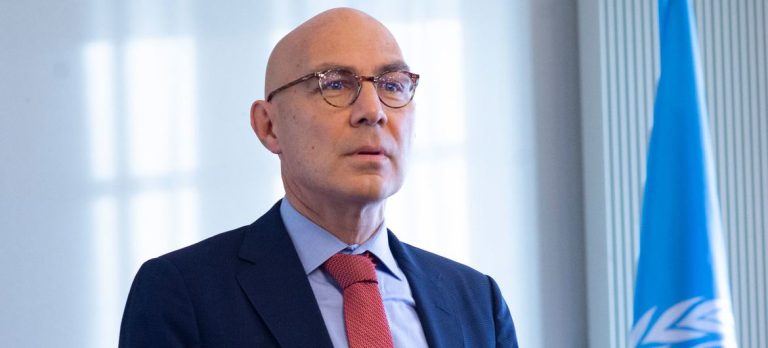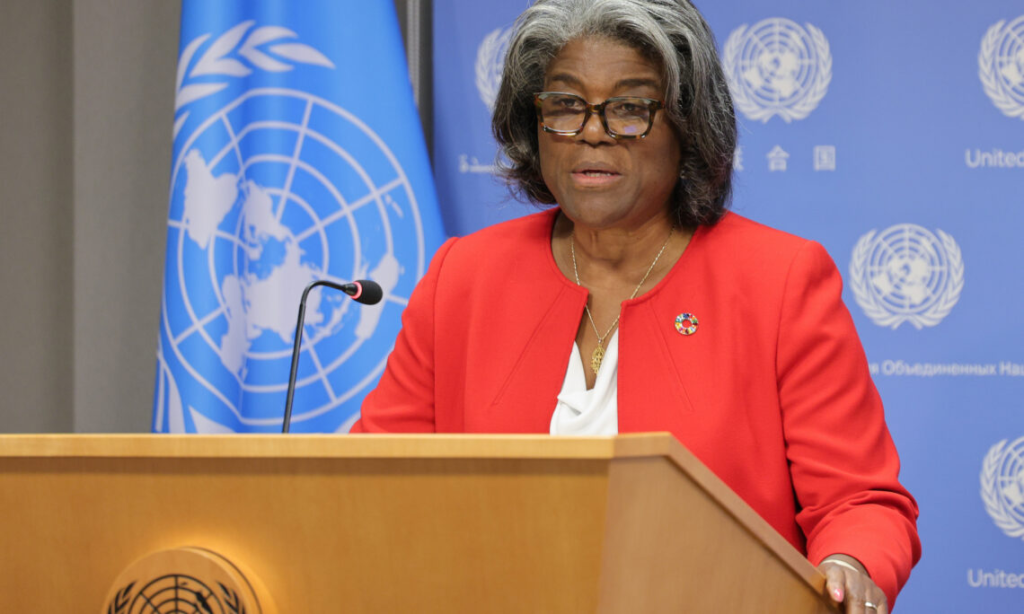
Photo: United Nations High Commissioner for Human Rights Volker Türk. Credit: U.N. Photo/Violaine Martin.
“A stifling, claustrophobic environment, where life is a daily struggle devoid of hope.”
New York, N.Y. The U.N. High Commissioner for Human Rights delivered a bleak assessment of the situation in North Korea on Wednesday, a decade after an in-depth report shed light on severe and widespread abuses in the country.
“Today, the DPRK is a country sealed off from the world,” Volker Türk told a special briefing of the U.N. Security Council that North Korea’s ambassador did not attend. “A stifling, claustrophobic environment, where life is a daily struggle devoid of hope.”
DPRK is the abbreviation for North Korea’s official name, the Democratic People’s Republic of Korea.
Türk expressed concern about the regime’s tight control over the movements of its citizens, including the ability to leave the country. Most North Koreans cannot obtain the required government permission to leave, and those who attempt to escape face torture, labor camps or death if they fail.

“Leaving your own country is not a crime – on the contrary, it is a human right, recognized by international law,” he said by video from his office in Geneva.
He said repression of the freedom of expression has also worsened with the enforcement of laws forbidding people from consuming foreign media or culture, such as South Korean television dramas or K-pop music.
“Put simply, people in the DPRK are at risk of death for merely watching or sharing a foreign television series,” the human rights chief said.
He urged Pyongyang to halt the use of the death penalty throughout its legal system and move toward its complete abolition.
Perhaps even more worrying, is the situation of food security in North Korea.
“Every single person interviewed by my office has mentioned this in one form or another,” Türk said. “In the words of one: “It’s very easy to become fragile and malnourished because there is nothing to eat.”
WFP Reports 40% of North Koreans, nearly 11 million people, are undernourished.
The World Food Program says more than 40% of North Koreans, nearly 11 million people, are undernourished. Many suffer from chronic malnutrition because of a lack of essential nutrients, especially those living outside major cities. Children are particularly affected, with 18% suffering stunting and impaired development because of chronic malnutrition.
The high commissioner also expressed concern about Pyongyang’s use of forced labor, including overseas. He noted that workers they have interviewed described often performing work that is physically dangerous and they endured extreme levels of surveillance.
Western nations accuse North Korea of using these laborers’ wages to help fund their illicit nuclear weapons and ballistic missile programs.
Türk said there have been some recent “positive signs” from North Korea in their engagement with the international human rights system, but he did not explain what that included.
Defector speaks
Gumhyok Kim, 33, grew up in privilege in North Korea. His family were Kim regime loyalists and so in 2010, he was able to leave the country and study in Beijing.
“At the age of 19, I saw a world for the first time that was different from everything I had learned,” he told the council. “In particular, the internet enabled me to learn about my country’s history and realize the horrific truth of North Korea that had been hidden from me.”
He said his feeling of loyalty to the Kim family that has ruled North Korea for three generations quickly turned to one of betrayal, and he began to connect with other North Korean students in Beijing to discuss the situation.
In the winter of 2011, the North Korean authorities discovered their activities, and he fled China to South Korea to avoid arrest.
“I survived and found freedom. But that freedom had come at a great cost,” he said. “It has already been 12 years since I defected, but I still have no contact with my family.”
He appealed directly to North Korean Leader Kim Jong Un, saying nuclear weapons and repression are not the way to maintain leadership.
“Allow North Koreans to live in freedom. Allow them their basic rights so they can live full and happy lives,” Kim said. “Turn away from the nuclear weapons threat and return your country to the family of nations so all North Korean people may lead prosperous lives.”
Kim and his South Korean-born wife chronicle their married life on YouTube, where they show what life is like in Seoul. He said he is now a father to a 1-year-old, and he hopes one day to take his son to a changed North Korea.
Council inaction
The U.N. Security Council is divided over the situation in North Korea. The last time its 15 members agreed on sanctions for the regime’s nuclear and ballistic missile activity was in 2017. Since then, the geopolitical landscape has changed, the council has become more fractured, and action on the North Korean file has become more difficult.
Both China and Russia objected to Wednesday’s human rights briefing, saying such issues do not belong in the Security Council. Russia called for a procedural vote, but lost, as only China joined it in voting against holding the meeting and 12 council members supported it. Mozambique abstained. There are no vetoes in procedural votes.

“The efforts by both Russia and China to block this meeting today is another effort to support the DPRK, and is also emboldening their actions,” U.S. Ambassador Linda Thomas-Greenfield said.
Venezuela’s envoy made a statement to reporters outside the council during the meeting on behalf of the “Group of Friends in Defense of Charter of the United Nations,” rejecting the convening of a human rights-specific council meeting. The group of 18 like-minded countries includes Russia, China, North Korea, Belarus, Iran, Cuba and Syria.
The council meeting was requested by the United States and Britain, along with Japan and South Korea, who both currently hold non-permanent council seats.
“The DPRK nuclear and human rights issues are like two sides of the same coin, and thus, need to be addressed comprehensively,” South Korean Ambassador JoonKook Hwang said.
He urged the council to regularly address the human rights situation. Until last August, the last time the council discussed North Korea’s human rights situation also was in 2017.
A 2014 Commission of Inquiry report found that North Korea’s rights violations had risen to the level of crimes against humanity. The panel said the regime had used “extermination, murder, enslavement, torture, imprisonment, rape, forced abortions and other sexual violence, persecution on political, religious, racial and gender grounds, the forcible transfer of populations, the enforced disappearance of persons and the inhumane act of knowingly causing prolonged starvation.”